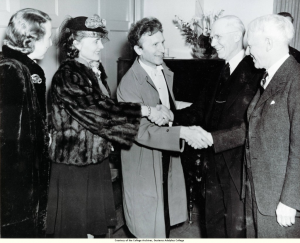Visit from Famous Composer, Percy Grainger

Percy Grainger, a renowned pianist and composer, visited campus for a few days in 1940 to teach, perform and lecture with the Gustavus Band.
He enjoyed himself so much he joined the ensemble for their 1941 tour of Minnesota. For two weeks in March, Grainger and the Gustavus Band traveled from Willmar to Duluth playing to enthusiastic audiences all across the state.
On their way to the finale in Cambridge, Minn., the bus stalled during a storm. In the 5 foot 4 inch snow, Grainger, along with Gustavus Band conductor Fredrick Hilary, jumped to the rescue.
Much to the students’ enjoyment, the two men tried to push the band’s bus to Cambridge.
IN PRAISE OF DEAD AIRYou talk about the precise sense of tnimig you have developed in this job, but it would be a mistake, I think, for the reader to assume that while you’re on the air, silence is verboten. Perhaps this is true on commercial stations, where every millisecond has a monetary value. But you and your colleagues at WDAV have the luxury of using silence when silence is called for. After an especially moving piece, it may be absolutely appropriate to allow three, four, perhaps as many as five seconds of silence after the final chord has died away for the full impact to be felt (part of the art is knowing exactly how long).Silence is an important part of musical composition, and since making radio is a form of composition (at least I think of it that way), silence has its place there, as well. But I’m preaching to the choir. I know that even silence is factored into the sense of tnimig that makes the art of the radio host seem so effortless to those of us who only listen.Of course there are also many times when silence is the wrong way to make the transition from a piece of music to whatever comes next. Sometimes what you’ve just played is so remarkable that the most appropriate response is an immediate and spontaneous “Holy Cow!” You did say “Holy Cow,” did you not?